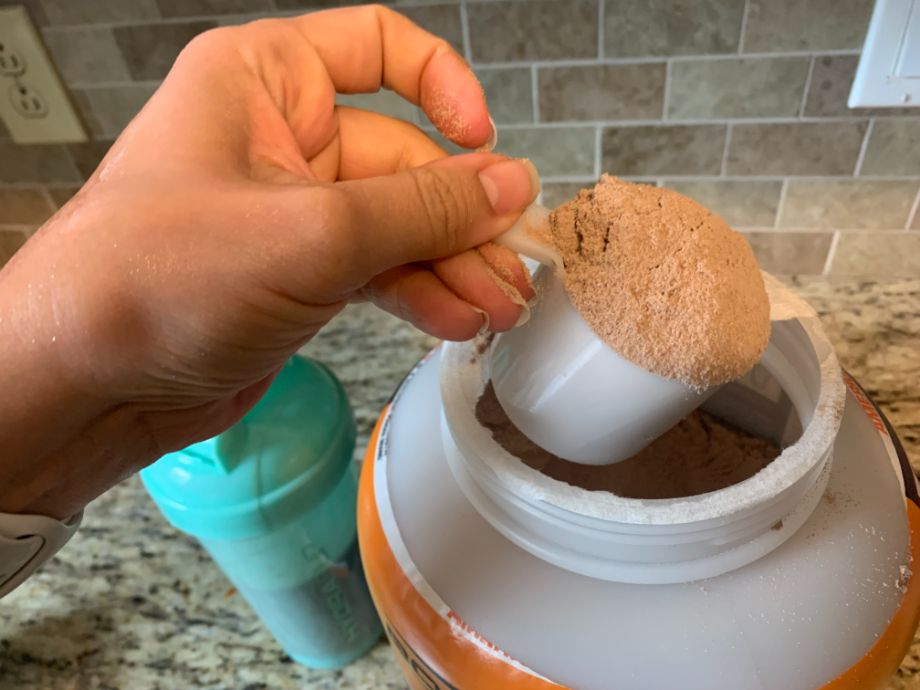We test and review fitness products based on an independent, multi-point methodology. If you use our links to purchase something, we may earn a commission. Read our disclosures.
The use of the best protein powder supplements is common among athletes, as well as among people seeking weight loss, due to its slower digestion in the stomach, promoting a feeling of fullness. However, protein also has a reputation for doing things to the gut that aren’t quite as welcome: smelly (and frequent) farts. Yep, people rarely talk about it, at least in public, but most of us who have ever had to adopt a high-protein diet know about it.
RELATED: Does Protein Make You Poop?
However, do protein sources and protein powder really cause you to fart more, or is there something else going on in the fitness community that could be an explanation? And, even if that’s the cause, what can you do to stop it from happening? As a registered dietitian, I’m here to break down (break wind?) everything you’d want to know about protein farts.
Medical disclaimer: This article is intended for educational and informational purposes only. It is not intended as a substitute for medical advice. For health advice, contact a licensed healthcare provider.
What Causes Protein Farts?
Contrary to popular belief (not to mention firsthand experience), there is no scientific evidence that a certain amount of protein from either high-protein foods or supplements can cause an embarrassing amount of gas. However, it can make the odor of it much harsher, which can be where the term “protein farts” stems from, as those toots are definitely of a different caliber. Even this fact, however, is mostly conjecture.
Given that it can only be imagined how difficult it would be to get funding for a large study about the cause of protein farts, most of the information we have about this effect is anecdotal. However, there are some plausible theories about what causes (and how you can prevent) these high-protein diet side effects.
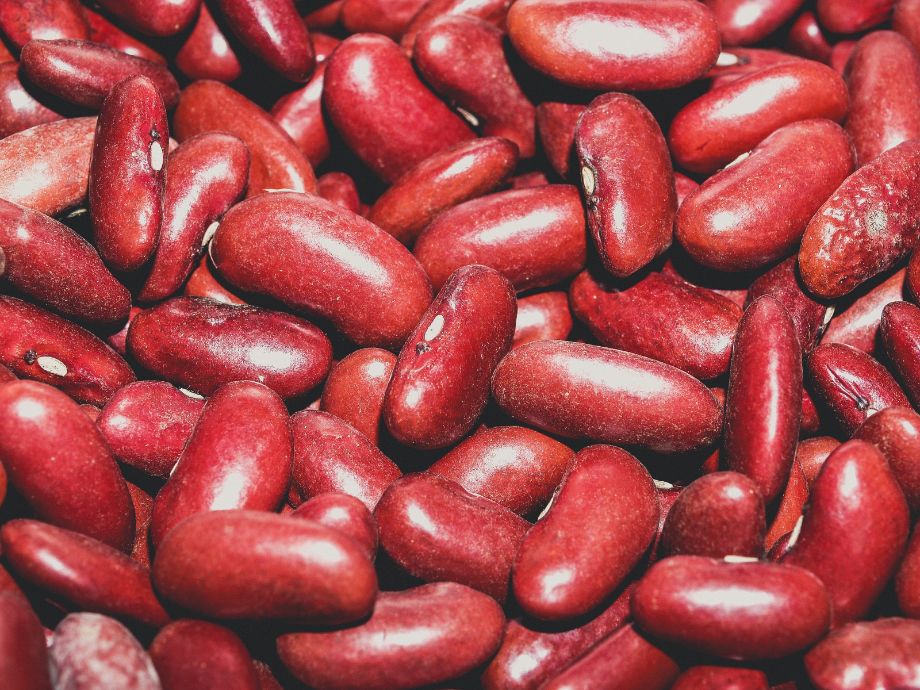
To start, here are some protein-containing foods that may cause excess gas:
- Milk
- Yogurt
- Legumes
- Lentils
- Oats
These foods all contain gas-causing compounds such as lactose, raffinose, and soluble fiber. That said, the people that tend to report a nasty case of the protein farts most often have this complaint while taking protein supplements like whey protein powder, not protein sources from food.
RELATED: Whey Protein Side Effects
These supplements contain ingredients that can cause some smelly chaos for the uninitiated digestive system. Some of these compounds include various additives, lactose, sugar alcohols, and artificial sweeteners.
Outside of whey protein powder, plant-based protein supplements may also cause some noxious gas. Pea protein powder or pea and rice protein blends have been known to cause intestinal gas as well as certain supplements that may still contain traces of the soluble fiber that cause the notorious flatulence—you know the rhyme—that happens after eating legumes.
RELATED: Pea Protein vs. Whey
Does Protein Powder Make Farts Worse?
Protein supplements seem to be the biggest source of complaint when it comes to the protein farts conversation, but are they actually the cause? Let’s start by talking about the different types of protein powder and how they may affect your digestion.
Whey Isolate & Concentrate
Whey isolate and concentrate are the most commonly found protein supplements out there due to the high quality of protein they provide and the speed of digestion. However, they can cause some digestive issues in those who have even a little bit of lactose intolerance due to being derived from milk proteins.
Whey isolate is more processed than concentrate in order to remove most of the fat and lactose. Thus, it can be 90 to 96% protein per serving and is much more friendly to those who are lactose intolerant. Without all of the extra ingredients and filler, this makes whey isolate more absorbable as well as being more tolerable to people with a sensitivity to lactose.
RELATED: Best Lactose-Free Protein Powder
If you truly want to minimize the side effects, whey hydrolysate has even less lactose because it is processed to remove virtually all whey ingredients except the protein. This causes minimal gut activity, which means minimal bloating and potential for gas production. However, as you can imagine, this whey is very pricey in comparison to isolate, so it’s not very easy to find.
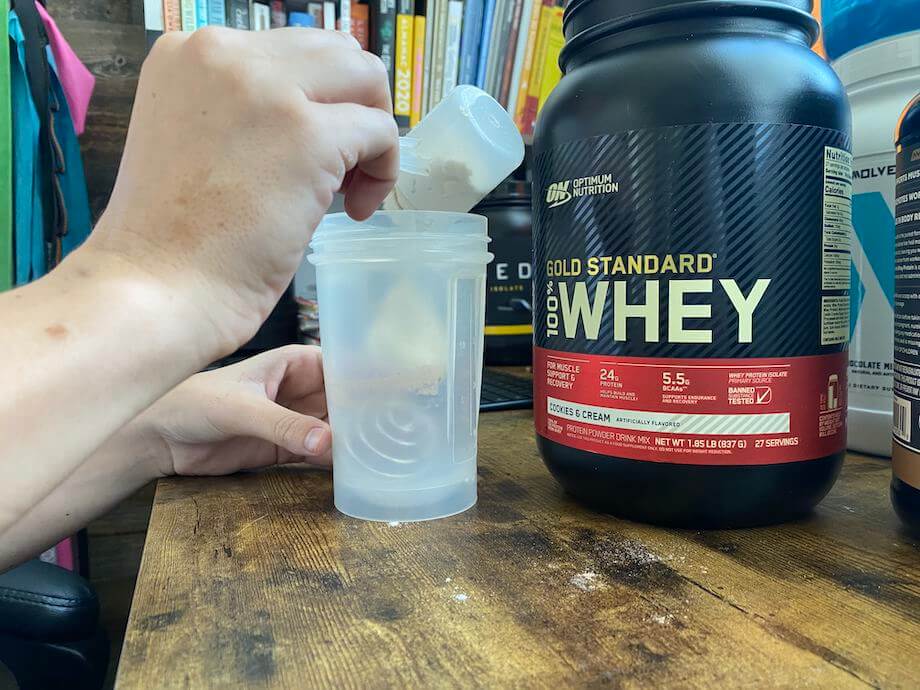
A whey concentrate, which contains more lactose and fat than a whey isolate, is the cheapest form of whey protein to produce. Why? Well it contains wildly varying levels of protein1 (from 35% to 80% per serving) and the remaining portion is usually a cheap filler like carbs from maltodextrin or other additives.
As someone who has legitimate lactose intolerance, I’ve experienced the smelly side effects of whey concentrate firsthand. I was once given a shake and told it was whey, but assumed it was whey isolate. Just an hour after chugging it, the bubble guts arrived right on cue, and when I frantically checked the label, sure enough the first ingredient was “whey concentrate.” The varying protein content of whey concentrate supplements isn’t only problematic from a value-for-cost standpoint, but for those with lactose intolerance as well.
That’s because, without the protein being isolated from the excess milk sugar and milk fats, as is the case with whey protein isolate, there are likely a lot of dairy-containing compounds slipping through the cracks and right into your gut. And considering protein content can be as low as 35%, the remaining 65% can certainly be blamed for the excess flatulence.
GGR Senior Editor Erin Chancer has mild lactose intolerance, and she says she’ll never take a gamble on whey concentrate again. “Even whey isolate can occasionally cause slight bloating and discomfort,” she says. “If you’re concerned about your lactose tolerance levels, start with a smaller serving to see how your body processes it.”
Casein Protein
If whey concentrate isn’t a cause of intestinal gas, casein protein is a great second suspect to put in your lineup. Casein is the main protein found in milk and is known for its slow-digesting properties. These properties are most commonly taken advantage of as a recovery tool, given the research that suggests taking casein before bed can help mitigate muscle soreness and provide latent recovery2.
RELATED: Benefits of Casein Protein
The slow digestion of this protein may be one reason for flatulence, however, especially if you already have a sensitivity to dairy or lack the gut enzymes needed to efficiently break down this protein. As a result, due to the slow digestion, the protein hangs out longer in the digestive tract, and as the digestive enzymes take longer to break it down, more gasses have an opportunity to form in the process3.
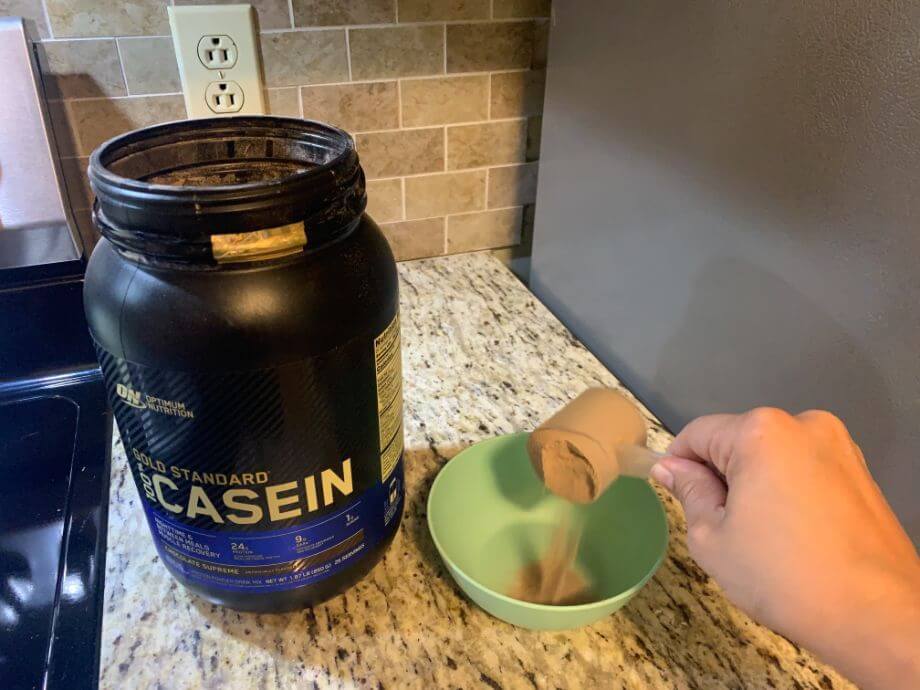
RELATED: Casein Protein vs. Whey
Finally, studies have shown that people with irritable bowel syndrome experienced digestive upset with casein protein4 unless it has been hydrolyzed, further suggesting casein is harder on the stomach than whey products. Thus, if you experience constant stomach upset with your protein shakes that just won’t go away, consider seeking professional medical advice as you may have an undiagnosed irritable bowel syndrome.
Pea Protein
Recently, pea protein has slowly gained popularity and demand as more consumers explore plant-based alternatives. Compared to similar products like hemp protein and brown rice protein, it contains more micronutrients and a more impressive amino acid profile for the active population, among other pea protein benefits.
It may, however, cause digestive problems due to trace amounts of the gas-causing fibers found in legumes, depending on its source and level of processing.
Tips to Reduce Protein Farts
So, we’ve established that the amount of protein is less of a factor in the protein farts issue than the type of protein, but what’s the best way to avoid this embarrassing byproduct of your active lifestyle?
Try More Whole Foods and Fewer Supplements
The biggest sufferers of protein farts may be making the common mistake of getting most of their protein intake from protein shakes and bars rather than whole foods. It may not be surprising that when the digestive tract is used to getting its amino acids from foods like chicken and quinoa, it has an abnormal reaction to pre-digested compounds like protein isolates.
RELATED: Chicken Breast Protein
Furthermore, since supplements are not regulated by the FDA, banking on consuming 100% wholesome ingredients is like playing Russian roulette. Taking supplements, especially those that are not third-party tested, means there could be any number of additives that can disrupt gut bacteria and cause gas.
In light of the fact that I hear fewer stories about gas caused by protein foods compared with protein supplements, you may want to assess how many supplements you’re taking and whether to replace them with whole foods. Consult a nutritionist or dietitian if you need assistance identifying foods to help you do this.
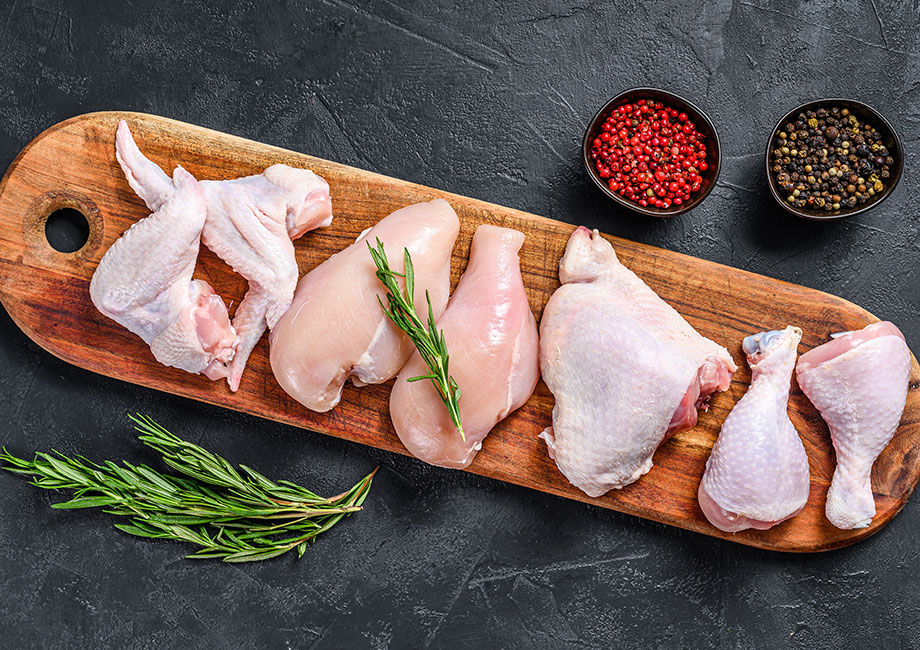
Reduce Dairy Intake if Intolerant
One of the more obvious solutions is to avoid dairy products entirely to help you with your protein intake if you have an intolerance. Lactose intolerance comes in different thresholds for different people, meaning that some people can have much more lactose than others without a reaction.
For example, I have lactose intolerance and can tolerate Greek yogurt and hard cheese just fine, but soft cheese and plain milk make me violently sick. Products like Greek yogurt and kefir tend to be more forgiving, as they contain probiotics. Research shows that a healthy amount of probiotics can make lactose products more tolerable for those with the lactase deficiency5 that’s associated with intolerance.
If you think lactose intolerance is the culprit, try to cut out dairy for a few days and see how your digestive system responds. You can also see if you are consuming any other foods known to commonly cause bloating and excess gas, like:
- Cabbage
- Broccoli
- Brussels sprouts
- Legumes
- Garlic
- Onions
Try Vegan Protein Powder
If you’ve taken a look at your diet but don’t want to give up your protein shakes to help you meet your goals, we totally get it. So, try opting for the best vegan protein powder, such as a soy or combination of pea and brown rice protein powder. Both have an amino acid profile that’s similar to whey and may reduce the chance of bloating and gas due to the lack of lactose. However, keep in mind that studies have suggested that the leucine content is lower than whey6, which can limit your anabolic potential.
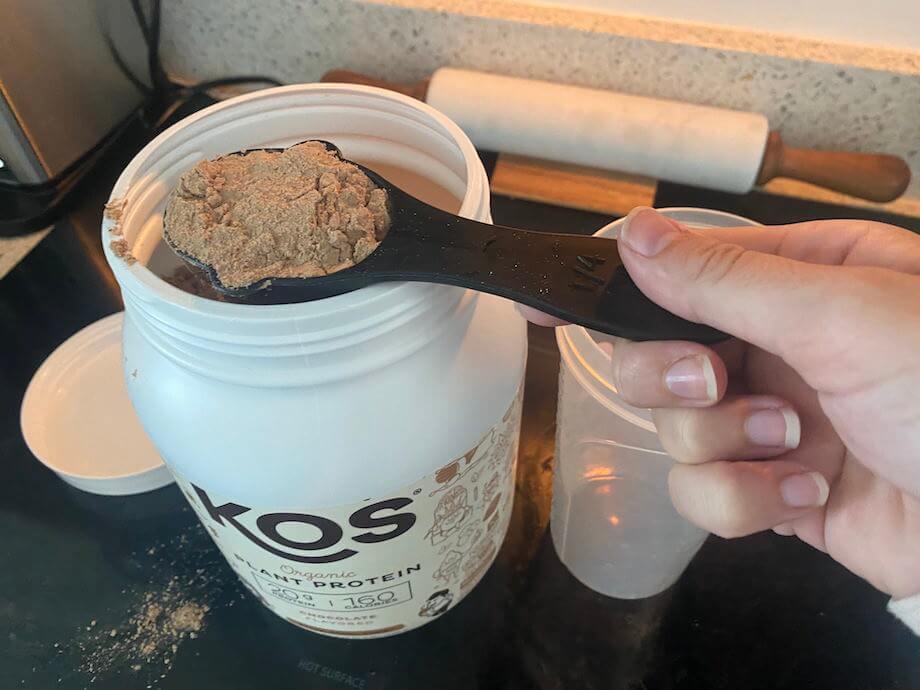
If this isn’t a concern for you, though, just be sure to check your labels on your plant-based proteins. Avoid those with too many ingredients on the label to limit the risk of something flaring up any digestive issues.
Get In Some Probiotics
Your digestive tract is filled with healthy bacteria, called probiotics, that aid in digestion. During digestion, certain bacteria produce hydrogen gas, which may cause those dreaded farts. Studies suggest that having a good population of beneficial bacteria can reduce the amount of gas production7, especially in the large intestine. You can get probiotics by taking them as supplements or eating fermented foods such as yogurt, kombucha, kimchi, or kefir.
RELATED: Best Probiotic
Avoid Protein Bars That Include Sugar Alcohols
There are naturally occurring sugar alcohols in foods like fruits and vegetables, such as xylitol and sorbitol. It is most likely that you are most familiar with sugar alcohols as the low-calorie sweeteners that many companies use to sweeten foods. Sugar alcohols are regarded as low-calorie sweeteners—although some people believe they’re zero-calorie sweeteners—meaning they still contribute some calories.
RELATED: Best Protein Bars
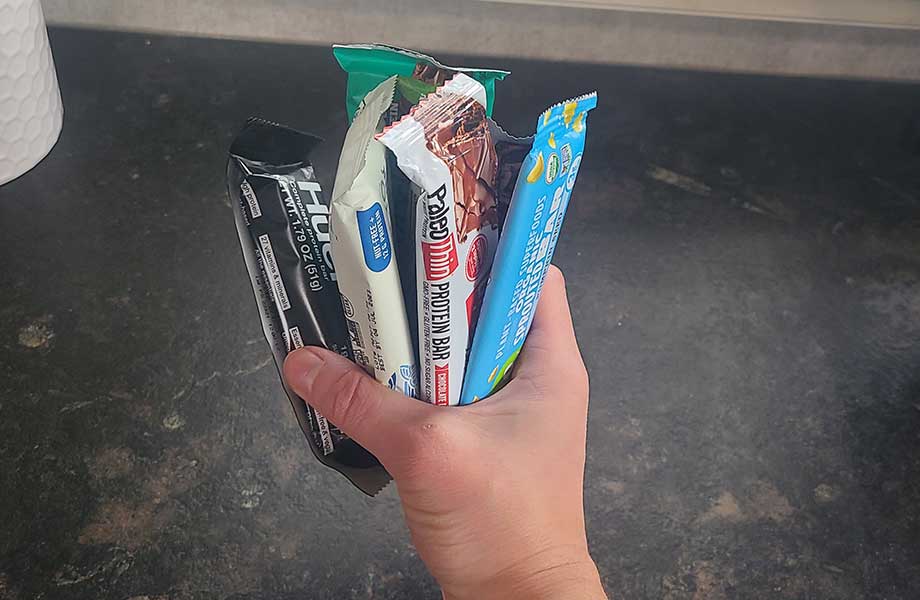
In this case, I’m less concerned about calories than I am about how sugar alcohols are low digestible carbs, meaning they aren’t completely absorbed by the small intestine8. Instead, they travel to your large intestine, where bacteria ferment them…and cause noisy, smelly havoc.
That said, sugar alcohols can be well-tolerated if taken in moderation. However, if you have a lot of protein to consume per day and use sugar alcohol-containing protein shakes or bars to meet these macronutrient numbers, you can find yourself consuming over the “tummy-hurting threshold” more easily than you might think.
How Much Protein to Eat
A general population should consume about 0.8 grams of protein per kilogram according to the Dietary Guidelines for Americans9, which specify recommended dietary allowances for all nutrients.
In order to find out what your weight is in kilograms, simply divide your body weight in pounds by 2.2 pounds. As a result, according to the USDA, if you weigh 120 pounds, you should consume a minimum of 43 grams of protein daily. However, these guidelines are meant to apply to an average person eating a 2,000-calorie diet, making it very generic advice.
For athletes, a sports dietitian would probably recommend much more than this. Even if you don’t train at the intensity of an elite or pro athlete, if you engage in at least four days a week of resistance training, you need more protein than the RDA recommends. This is simply because your muscles need more amino acids for recovery when you engage in this volume and type of exercise. This is especially true if you’re going through a bulking or cutting cycle, which both come with a hefty protein requirement. Athletes should consume about 1.6 to 1.8 grams of protein per kilogram of body weight, according to the American College of Sports Medicine10.
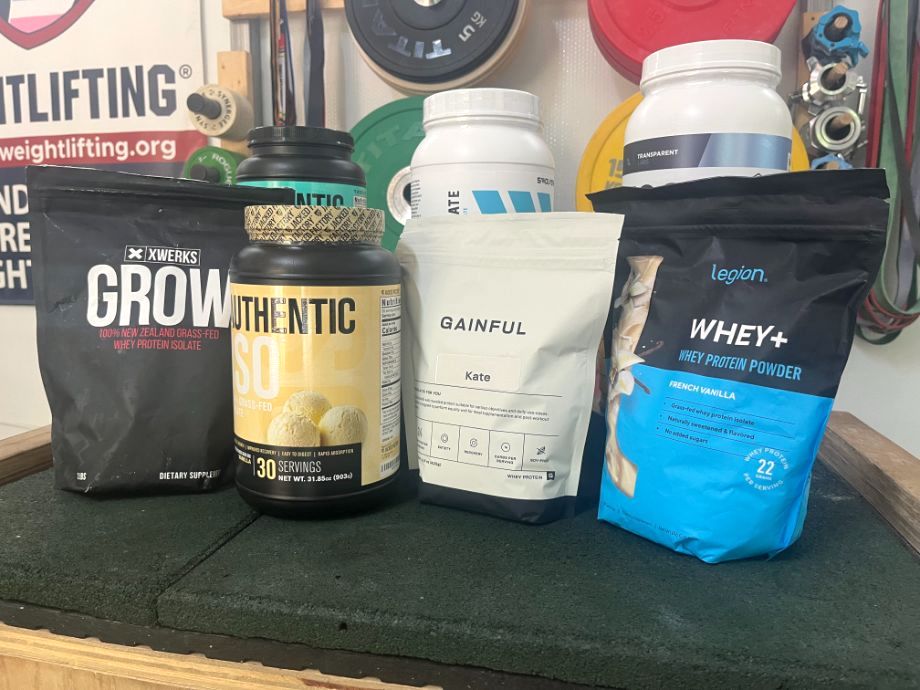
Protein needs can vary; however, if the athlete is doing body recomposition, the volume of exercise, gender, age, and other factors have an impact. Don’t worry about overdoing it on your protein levels. People who eat a lot of protein and get “the farts” assume their body is telling them that they’re getting too much. However, for the average person with no health conditions, there is no evidence that a high-protein diet can cause adverse effects.
RELATED: How Much Protein is Too Much?
Big asterisk here, though: It’s possible that your protein intake is going overboard if it’s displacing carbohydrates, produce, and healthy fats in your diet. You still need a balance of all of these health-promoting foods both for athletic performance and overall health. Furthermore, if you are just blindly housing protein foods without knowing how much protein your body can absorb, you could be giving your body more than it needs and just producing very expensive, amino-acid latent waste that’s expelled from your body.
If you really want to know how much protein you should be eating and how to adjust your macronutrient needs safely, talk to a registered dietitian nutritionist to assess your individual protein needs.
Protein Farts: Final Thoughts
Protein farts are more of an inconvenience than anything else, and the cause is usually not due to the protein itself, rather the supplements we consume to meet our protein needs on a high-protein diet.
When you begin taking whey protein powders and snacks, you may experience increased flatulence. Some people may experience bloating or even constipation from it, especially those with irritable bowel syndrome or lactose intolerance who already have digestion and absorption issues.
RELATED: Protein Snack Ideas
The majority of dairy-based protein supplements, such as whey or casein, should be avoided if you have lactose intolerance or if you suspect lactose intolerance is the cause for your wind breaking. If you do this and continue to experience excess gas, check the labels on your supplements to see if there are any extra ingredients you may have a food intolerance to. Otherwise, contact a healthcare professional to rule out more serious disorders such as irritable bowel syndrome or celiac disease.
Protein Farts: FAQs
Does protein cause smelly farts?
Food intolerance, additives in protein powder, and certain fiber sources can all be the source of smelly farts. However, there is no research to suggest that protein itself is the cause of excess gas.
Why do I fart so much after eating protein?
If you start eating a lot of protein from supplements, you may notice an increase in gas. Certain carbs can also be a cause of gas, so if you’ve recently increased your calorie intake from both protein and carbs, that’s a likely cause.
Why do I fart so much when I eat healthy?
Many healthy foods, like beans and cruciferous vegetables, can cause farting due to the gasses that are produced as gut bacteria ferments the special fibers contained in these foods.
RELATED: Do Greens Make You Poop?
Do bodybuilders fart a lot?
Simply put, those who engage in bodybuilding and high-impact training likely do experience increased flatulence due to the likelihood that they’re taking protein supplements to help contribute to their overall protein intake. But we’re not here to judge.
These statements have not been evaluated by the Food and Drug Administration. This product is not intended to diagnose, treat, cure, or prevent any diseases.
References
- Reitelseder S, Agergaard J, Doessing S, et al. Whey and casein labeled with L-[1-13C]leucine and muscle protein synthesis: effect of resistance exercise and protein ingestion. Am J Physiol Endocrinol Metab. 2011;300(1):E231-E242. doi:10.1152/ajpendo.00513.2010
- Res PT, Groen B, Pennings B, et al. Protein ingestion before sleep improves postexercise overnight recovery. Med Sci Sports Exerc. 2012;44(8):1560-1569. doi:10.1249/MSS.0b013e31824cc363
- Tagliamonte S, Barone Lumaga R, De Filippis F, et al. Milk protein digestion and the gut microbiome influence gastrointestinal discomfort after cow milk consumption in healthy subjects. Food Res Int. 2023;170:112953. doi:10.1016/j.foodres.2023.112953
- Laatikainen R, Salmenkari H, Sibakov T, Vapaatalo H, Turpeinen A. Randomised Controlled Trial: Partial Hydrolysation of Casein Protein in Milk Decreases Gastrointestinal Symptoms in Subjects with Functional Gastrointestinal Disorders. Nutrients. 2020;12(7):2140. Published 2020 Jul 18. doi:10.3390/nu12072140
- Leis R, de Castro MJ, de Lamas C, Picáns R, Couce ML. Effects of Prebiotic and Probiotic Supplementation on Lactase Deficiency and Lactose Intolerance: A Systematic Review of Controlled Trials. Nutrients. 2020;12(5):1487. Published 2020 May 20. doi:10.3390/nu12051487
- van Vliet S, Burd NA, van Loon LJ. The Skeletal Muscle Anabolic Response to Plant- versus Animal-Based Protein Consumption. J Nutr. 2015;145(9):1981-1991. doi:10.3945/jn.114.204305
- Bailey J, Carter NJ, Neher JO. FPIN’s Clinical Inquiries: Effective management of flatulence. Am Fam Physician. 2009;79(12):1098-1100.
- Ruiz-Ojeda FJ, Plaza-Díaz J, Sáez-Lara MJ, Gil A. Effects of Sweeteners on the Gut Microbiota: A Review of Experimental Studies and Clinical Trials [published correction appears in Adv Nutr. 2020 Mar 1;11(2):468]. Adv Nutr. 2019;10(suppl_1):S31-S48. doi:10.1093/advances/nmy037
- Snetselaar LG, de Jesus JM, DeSilva DM, Stoody EE. Dietary Guidelines for Americans, 2020-2025: Understanding the Scientific Process, Guidelines, and Key Recommendations. Nutr Today. 2021;56(6):287-295. doi:10.1097/NT.0000000000000512
- Stokes T, Hector AJ, Morton RW, McGlory C, Phillips SM. Recent Perspectives Regarding the Role of Dietary Protein for the Promotion of Muscle Hypertrophy with Resistance Exercise Training. Nutrients. 2018;10(2):180. Published 2018 Feb 7. doi:10.3390/nu10020180
Further reading

Increasing your protein intake may offer several health benefits. But what are the high-protein diet side effects? Read more

Many people are familiar with the creatine benefits of strength and muscle growth, but there are more that might surprise you. Read more

The use of the best protein powder supplements is common among athletes, as well as among people seeking weight loss, due to its slower digestion in the stomach, promoting a feeling of fullness. However, protein also has a reputation for doing things to the gut that aren’t quite as welcome: smelly (and frequent) farts. Yep, people rarely talk about it, at least in public, but most of us who have ever had to adopt a high-protein diet know about it. » Read more about: Does Protein Powder Really Give You Protein Farts? » Read more

The use of the best protein powder supplements is common among athletes, as well as among people seeking weight loss, due to its slower digestion in the stomach, promoting a feeling of fullness. However, protein also has a reputation for doing things to the gut that aren’t quite as welcome: smelly (and frequent) farts. Yep, people rarely talk about it, at least in public, but most of us who have ever had to adopt a high-protein diet know about it. » Read more about: Does Protein Powder Really Give You Protein Farts? » Read more

